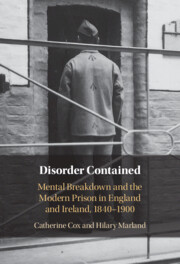2 results
2 - The Making of the Modern Prison System
-
- Book:
- Disorder Contained
- Published online:
- 03 March 2022
- Print publication:
- 10 March 2022, pp 23-76
-
- Chapter
-
- You have access
- Open access
- HTML
- Export citation

Disorder Contained
- Mental Breakdown and the Modern Prison in England and Ireland, 1840 – 1900
-
- Published online:
- 03 March 2022
- Print publication:
- 10 March 2022
-
- Book
-
- You have access
- Open access
- Export citation

